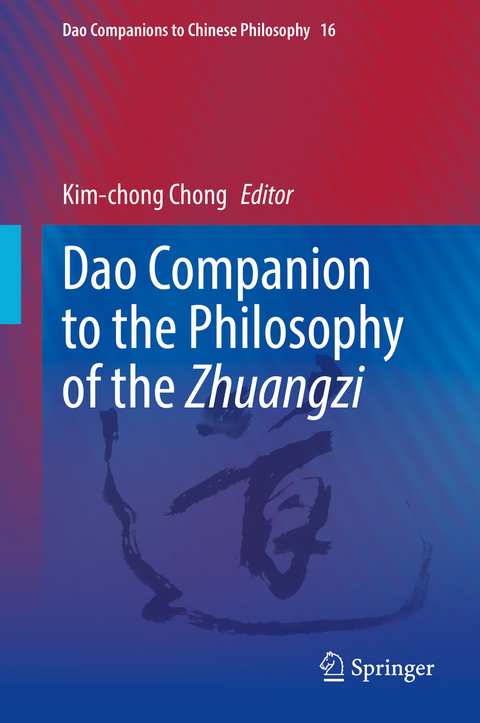
Dao Companion to the Philosophy of the Zhuangzi
Springer International Publishing (Verlag)
978-3-030-92330-3 (ISBN)
This comprehensive collection brings out the rich and deep philosophical resources of the Zhuangzi. It covers textual, linguistic, hermeneutical, ethical, social/political and philosophical issues, with the latter including epistemological, metaphysical, phenomenological and cross-cultural (Chinese and Western) aspects. The volume starts out with the textual history of the Zhuangzi, and then examines how language is used in the text. It explores this unique characteristic of the Zhuangzi, in terms of its metaphorical forms, its use of humour in deriding and parodying the Confucians, and paradoxically making Confucius the spokesman for Zhuangzi's own point of view. The volume discusses questions such as: Why does Zhuangzi use language in this way, and how does it work? Why does he not use straightforward propositional language? Why is language said to be inadequate to capture the "dao" and what is the nature of this dao? The volume puts Zhuangzi in thephilosophical context of his times, and discusses how he relates to other philosophers such as Laozi, Xunzi, and the Logicians.
Kim-chong Chong is Professor at the Division of Humanities, Hong Kong University of Science and Technology. A previous position was at the Department of Philosophy, National University of Singapore where he also served as Head of Department. He is the author of Early Confucian Ethics (Open Court, 2007) and Zhuangzi's Critique of the Confucians (SUNY Press, 2016). Kai-Yuan Cheng is Professor and Dean at the Institute of Philosophy of Mind and Cognition, School of Humanities and Social Sciences, National Yang-Ming University in Taipei, Taiwan. He is the author of numerous papers that appear in international journals, such as Philosophical Studies, Minds and Machines, Philosophy East and West. He is currently working on a book manuscript on Zhuangzi's Philosophy from the perspectives of philosophy of mind and language.
1. Introduction(Chong).- Part 1. Text, Authorship and Zhuangzi.- 2. Authorship of the Zhuangzi(Keung Lo).- 3. Various Positions on Zhuangzi Scholarship(Klein).- 4. The Commentarial Tradition on the Zhuangzi(Chai).- 5. A Portrait of Zhuangzi(Chong).- Part 2. Central Concepts.- 6. Zhuangzi on ming ( ) (Raphals).- 7. Zhuangzi's Idea of Being One (weiyi ) (Fung).- 8. Getting and Forgetting Oneness in the Zhuangzi (Ziporyn).- 9. The Ontology of the Vast and the Minute (daxiao ) (Coutinho).- 10.Transformation of Things and Qi (wuhua , qihua ) (Sato).- 11. Virtue/Power (de ) (Chan).- 12. No Emotions (wu qing ) (Chai).- 13. The Division between Heaven (tian ) and Human (ren ) (Perkins).- 14. Fasting of the Heart-Mind (xin zhai ) (Zhang).- 15. The True Person (zhen ren ) and True Knowledge ( ) (Xu).- Part 3. Language and Metaphor.- 16. The Language of the Zhuangzi (Porat).- 17. Yan ( Words) and Yi ( Meaning) (Fang).- 18. Zhuangzi's conception of Yu Yan ( Imputed Words) and Zhi Yan ( Goblet Words) (Fried).- 19. Humor and its Philosophical Significance in the Zhuangzi (Moeller).- 20. Those Who Can Fly Without Wings: The Depiction of Ideal Persons in the Inner Chapters of the Zhuangzi (Lin).- Part 4. Central Concepts.- 21. Confucius as a Literary and Philosophical Figure in the Zhuangzi (Cook).- 22. The Relation between Laozi and Zhuangzi (Fried).- 23. Xunzi and Zhuangzi (Ting).- 24. Zhuangzi and the Logicians (Kwok).- 25. Zhuangzi and Religious Daoism (Kohn).- 26. Zhuangzi and Wei-Jin Xuanxue (Lo).- 27. Zhuangzi and Neo-Confucianism (Tan).- 28. Zhuangzi and Buddhism (Hong).- Part 5. Ethics, Value and Knowledge.- 29. Zhuangzi and Normative Ethics (Fraser).- 30. Internal Sages and External Kings: Moral Pluralism and Happiness in the Zhuangzi (Nam).- 31. The Value of Spontaneity (Luk).- 32. Filial Piety in the Zhuangzi-"Let the Parents Forget You" (Chiu).- 33. How Much Intuition Goes Into Intuitive Skill? (Wong).- 34. What Do the Skill Masters Know? (Lai).- 35. Skepticism and Relativism in the Zhuangzi (Sturgeon).- 36. Zhuangzi from the Neuro-Scientific Perspective (Raphals).- 37. The Problem of Freedom in the Zhuangzi (Jiang).- 38. Implied Social and Political Values in the Zhuangzi (Lee).- Part 6. The Zhuangzi and Western Philosophy.- 39. The "art of sauntering" in the Zhuangzi and in the writings of Henry David Thoreau (Lin).- 40. Buber, Heidegger and Zhuangzi (Nelson).- 41. The Cementing and Loosening of Human Bonds in Spinoza and the Zhuangzi (Ozbey).-42. The Aesthetic in Kant and the Zhuangzi (Guzowska).- 43. Zhuangzi's Notion of the True Master and Wittgenstein's Grammatical Investigation (Cheung).- 44. The Art of Nourishing Life-Philosophical Therapies in the Platonic Dialogues and the Zhuangzi (Sikri).- 45. Zhuangzi and Nietzsche (Shang).- 46. Is Zhuangzi a Wanton? A Comparison Between Zhuangzi's Theory of Freedom and Frankfurt's Notion of Personhood(Hung).
| Erscheinungsdatum | 24.09.2022 |
|---|---|
| Reihe/Serie | Dao Companions to Chinese Philosophy |
| Zusatzinfo | XII, 823 p. 5 illus. |
| Verlagsort | Cham |
| Sprache | englisch |
| Maße | 155 x 235 mm |
| Gewicht | 1357 g |
| Themenwelt | Geisteswissenschaften ► Philosophie ► Allgemeines / Lexika |
| Geisteswissenschaften ► Philosophie ► Geschichte der Philosophie | |
| Geisteswissenschaften ► Philosophie ► Östliche Philosophie | |
| Geisteswissenschaften ► Philosophie ► Philosophie der Neuzeit | |
| Geisteswissenschaften ► Religion / Theologie | |
| Sozialwissenschaften | |
| Schlagworte | Chinese and Comparative Philosophy • Daoism and Daoist Philosophy • Emotions • Freedom and Personal Identity • History of Chinese philosophy • Nature and the Human • spontaneity • Transformation and Forgetting • Wandering and Sauntering • Zhuangzi |
| ISBN-10 | 3-030-92330-4 / 3030923304 |
| ISBN-13 | 978-3-030-92330-3 / 9783030923303 |
| Zustand | Neuware |
| Haben Sie eine Frage zum Produkt? |
aus dem Bereich


